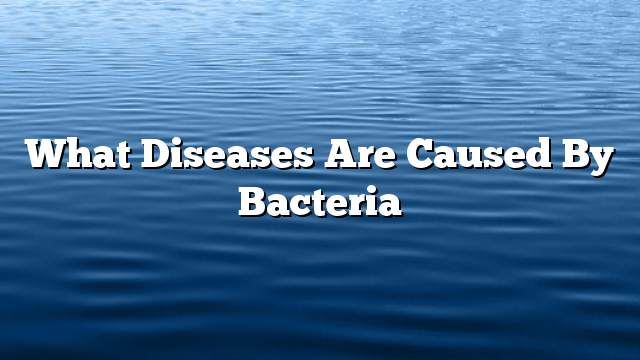Bacteria
Bacteria are microscopic, single-cell microorganisms that enter the cells of the body in many ways and use these cells to grow and multiply and destroy these cells and stop their work and hence cause diseases and called these bacteria the name of the pathogens, bacteria are the most prevalent living organisms, Most often live within the human body without any diseases, we find bacteria in the mouth and skin, and intestines, but the bacteria that cause diseases do not live in the human body naturally, and also occur diseases that bacteria cause when these cells multiply in tissues The body causes many diseases such as pneumonia, gonorrhea and tuberculosis. Some bacteria can produce toxins that attack muscles and nerves, cause diseases such as tetanus bacteria, and food poisoning caused by some toxins produced by bacteria in food due to food contamination.
The most important diseases caused by bacteria
- Chlamydia: Infectious and parasitic bacteria that attack the reproductive system in women, where women notice vaginal secretions, problems in urination in men due to the presence of these bacteria in the urinary system and cause severe pain during urination, and inflammation of the eye during the first days of the child’s age can also be infected Pneumonia, and these bacteria transmitted sexually, so avoid contact with patients during the period of infection.
- Scarlet fever is one of the most important microbes that cause sore throat, and causes other severe symptoms such as fever, stress, and joint pain. There are no means of preventing infection with this type of bacteria, but the patient acquires immunity as a result of infection with these bacteria.
- Syphilis: An infection that affects the reproductive system due to infection with bacteria causing the disease, and symptoms of the disease is the presence of ulcers in the reproductive system and can extend these ulcers to the tongue and lips. The duration of infection with this disease is long can reach two to four years, taking care not to have sexual contact with the patient during the period of the disease.
- Tuberculosis: Infectious bacteria cause the disease and is a serious disease that threatens human life, which affects the respiratory system in particular and can extend to the injury of kidneys, liver and glands, and the symptoms of this disease is pneumonia accompanied by cough and phlegm accompanied by the emergence of blood, and high temperature , Chest pain, the patient must undergo the necessary medical care, and be admitted to the hospital for treatment because the disease can be dangerous to the patient’s life.
